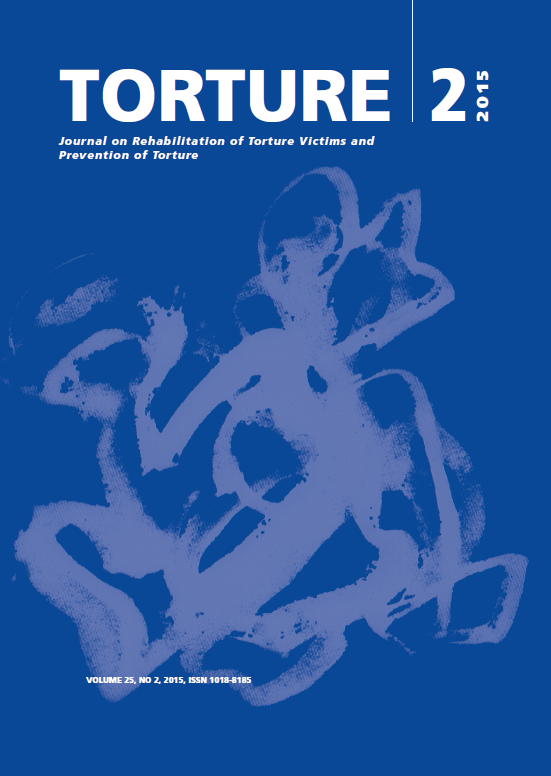Testimonial Therapy: Impact on social participation and emotional wellbeing among Indian survivors of torture and organized violence
DOI:
https://doi.org/10.7146/torture.v25i2.109672Keywords:
Torture, trauma, rehabilitation, India, Testimonial Therapy, violence, community empowerment, emotionsAbstract
Introduction: Traumatizing events, such as torture, cause considerable impairments in psycho-social functioning. In developing countries, where torture is often perpetrated, few resources exist for the provision of therapeutic or rehabilitating interventions. The current study investigated the effectiveness of Testimonial Therapy (TT) as a brief psycho-social intervention to ameliorate the distress of Indian survivors of torture and related violence.
Method: Three outcome measures (the WHO-5 Well-Being Scale, Social Participation-Scale and Pain and Anger Analogue) were compared before and after receiving TT, and semi-structured interviews were conducted with survivors who had previously received TT.
Findings: Participants showed significant improvements in emotional well-being, social participation, and self-perceived pain and anger. Furthermore, three qualitative interviews
with survivors indicated that TT had a positive impact at the community level.
Discussion: Although the study was conducted without a control group for comparison, TT appeared to be an effective method for improving well-being and ameliorating distress among survivors of torture. Furthermore, TT can potentially promote community empowerment. However, more research on this aspect is needed.
References
2. Agger I, RaghuvanshI L, Khan SS, Polatin P, Laursen LK. Testimonial therapy: A pilot project to improve psychological well-being among survivors of torture in India. Torture. 2009;19(3):204– 16.
3. Agger I, Igreja V, Kiehle R, Polatin P. Testimony ceremonies in Asia: Integrating spirituality in Testimonial Therapy for torture survivors India, Sri Lanka, Cambodia, and the Philippines. Transcult Psychiatry. 2012 Jul;49(3-4):568–89.
4. Cienfuegos AJ, Monelli C. The testimony of political repression as a therapeutic instrument. American Journal of Ortho Psychiatry. 1983;53(1):43–51.
5. Weine SM, Kulenovic AD, Pavkovic I, Gibbons R. Testimony Psychotherapy in Bosnian Refugees: A Pilot Study. American Journal of Psychiatry. American Psychiatric Publishing; 1998 Dec;155(12):1720–6.
6. Agger I, Jensen SB. Testimony as ritual and evidence in psychotherapy for political refugees. J Trauma Stress. Wiley-Blackwell; 1990 Jan;3(1):115–30.
7. Lustig SL, Weine SM, Saxe GN, Beardslee WR. Testimonial Psychotherapy for Adolescent Refugees: a Case Series. Transcult Psychiatry. SAGE Publications; 2004 Mar 1;41(1):31–45.
8. Curling P. Using Testimonies as a Method of Early Intervention for Injured Survivors of the Bombing of the UN Headquarters in Iraq. Traumatology. American Psychological Association (APA); 2005;11(1):57–63.
9. Igreja V, Kleijn W, Schreuder B. Testimony method to ameliorate post-traumatic stress symptoms: a Community-based intervention study with Mozambican civil war survivors. Br J Psychiatry. Royal College of Psychiatrists; 2004 Mar 1;184(3):251–7.
10. Van Dijk JA, Schoutrop MJA, Spinhoven P. Testimony Therapy: Treatment Method for Traumatized Victims of Organized Violence. Am J Psychother. 2003;57(3):361–72.
11. Agger I, RaghuvanshI L. Giving Voice Using Testimony as a Brief Therapy Intervention in Psychosocial Community work for Survivors of Torture and Organised Violence. Manual for Community Workers and Human Rights Defenders. India: Uttar Pradesh; 2008.
12. Raghuvanshi L. Justice, Liberty, Equality Dalits in Independent India. London: Frontpage; 2012.
13. Lowe B, Spitzer R, Grafe K, Kroenke K, Quenter A, Zipfel S, et al. Comparative validity of three screening questionnaires for DSM-IV depressive disorders and physicians’ diagnoses. J Affect Disord. Elsevier BV; 2004 Feb;78(2):131–40.
14. Bech P. Measuring the dimensions of psychological general well-being by the WHO-5. Quality of Life Newsletter. 2004;(32):15–6.
15. Wellbeing measures in primary healthcare: The DEPCARE project. Report on a meeting conducted in Stockholm, Sweden. Copenhagen: World Health Organization Regional Office for Europe; 1998 Feb.
16. Van Brakel W, Anderson A, Mutatkar R, Bakirtzief Z, Nicholls P, Raju M. The Participation Scale: Measuring a key concept in public health. Disability and Rehabilitation. 2006;28(4):193– 203.
17. Hawker G, Mian S, Kendzerska T, French M. Measures of Adult Pain: Visual Analog Scale for Pain (VAS Pain), Numeric Rating Scale for Pain (NRS Pain), McGill Pain Questionnaire (MPQ), Short-Form McGill Pain Questionnaire (SFMPQ),Chronic Pain Grade Scale (CPGS), Short Form-36 Bodily Pain Scale (SF-36 BPS), and Measure of Intermittent and Constant Osteoarthritis Pain (ICOAP). Arthritis Care & Research. 2011 Nov 7;63(S11):240–52.
18. Laverack G. Improving Health Outcomes through Community Empowerment: A Review of the Literature. Journal of Health, Population, and Nutrition. 2006 Mar;24(1):113–20.
19. Kawachi I, Kennedy BP, Lochner K. Long live community: Social capital as public health. Am Prospect. 1997;(35):56–9.
Downloads
Published
How to Cite
Issue
Section
License
We accept that some authors (e.g. government employees in some countries) are unable to transfer copyright. The Creative Commons Licence Attribution-NonCommercial-NoDerivatives 4.0 International (CC BY-NC-ND 4.0) covers both the Torture Journal and the IRCT web site. The publisher will not put any limitation on the personal freedom of the author to use material contained in the paper in other works which may be published, provided that acknowledgement is made to the original place of publication.


